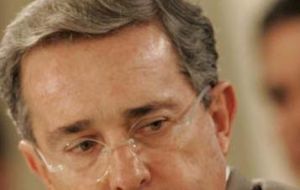MercoPress. South Atlantic News Agency
Uribe's tough hand on FARC issue balloons his popularity, 82%
 Pte. Uribe during the Grupo Rio summit
Pte. Uribe during the Grupo Rio summit In a clear support of his tough handling of the guerrilla issue Colombian President Alvaro Uribe's popularity rose to a record 82%, the highest since he took office in 2002according to a Gallup pole published on Thursday, thanks to his handling of a recent diplomatic spat with Ecuador and Venezuela.
The two neighboring countries broke diplomatic ties with Uribe's government and sent troops to their Colombian borders after he ordered a military strike into Ecuadorian territory on March first to kill a top cocaine funded FARC rebel leader. The poll of 1,000 Colombians was taken at the high point of the crisis, from March 4-6, as regional leaders criticized Colombia for violating Ecuador's sovereignty. But the conservative Uribe won points at home first by ordering the strike that killed FARC rebel leader Raul Reyes and then with his handling of the diplomatic dispute, which was settled at a summit in the Dominican Republic on Friday. He accused the leftist leaders of Ecuador and Venezuela of not cooperating in the fight against drug-running Colombian guerrillas but promised no more incursions into neighboring territory. The poll, taken by Gallup Colombia Ltd. in Colombia's four biggest cities -- Bogota, Medellin, Cali and Barranquilla -- had a margin of error of about 3 percentage points. The last survey by the same company in January gave the president a popularity rating of 80%. Gallup Colombia's manager Jorge Londoño said that support for Mr. Uribe soared with the backing he received from different political groups and public opinion during the tense week of diplomacy. The poll shows 82% support for the way Uribe is handling the combat against the guerrillas; 83% the way he fights the drug lords and 80% for his role in international affairs. Colombia's economy has picked up under Uribe, who won re-election in 2006 after cutting urban crime and spurring investment with his U.S.-backed crackdown on the Revolutionary Armed Forces of Colombia, or FARC. His strongest supporters are gathering signatures in support of a measure to change the constitution to allow him to run for an unprecedented third term in 2010 Another interesting discovery of the latest opinion poll is that former presidential candidate Ingrid Betancourt, a hostage of FARC for the last six years has become the most popular public figure in Colombia with 71% backing. The survey excluded President Uribe. "Ingrid has become an icon of the kidnapped, the latest images of her in the jungle certainly had much to do with this support", said Londoño. In December 2007 a video was disclosed showing the former candidate notoriously thin, pale and clearly suffering. However Colombian Senator Piedad Cordoba who together with Venezuelan president Hugo Chavez brokered some of the recent hostages' releases had a negative image of 69%, only beaten by the Colombian public opinion disapproval of Mr. Chavez, 90%. In related news the governments of Venezuela and Colombia's issued statements Thursday night saying the two presidents, Chavez and Uribe had spoken by phone and agreed to meet in person. The governments said the leaders plan to meet soon to strengthen relations after their confrontation over the Colombian military's March first cross-border attack in Ecuador that killed 25 people, including a Colombian rebel leader. It was unclear how soon their meeting could take place. Chavez and Uribe "renewed their commitment of trust and mutual collaboration so that neither Venezuela nor Colombia are victims of violent groups, whatever their origin," said a statement released from Bogota. Chavez made the call, and in the conversation the leaders expressed "all the willingness to re-establish the best relations between the governments," it said. The two presidents made clear "their willingness to cooperate to avoid aggressions of any kind," Venezuela said in its statement. Until late last year Uribe and Chavez had managed to maintain cordial relations in spite of deep ideological difference. Their countries are major trading partners, with billions of dollars in business each year including imports of Colombian food that help Chavez's government cope with sporadic shortages.




Top Comments
Disclaimer & comment rulesCommenting for this story is now closed.
If you have a Facebook account, become a fan and comment on our Facebook Page!